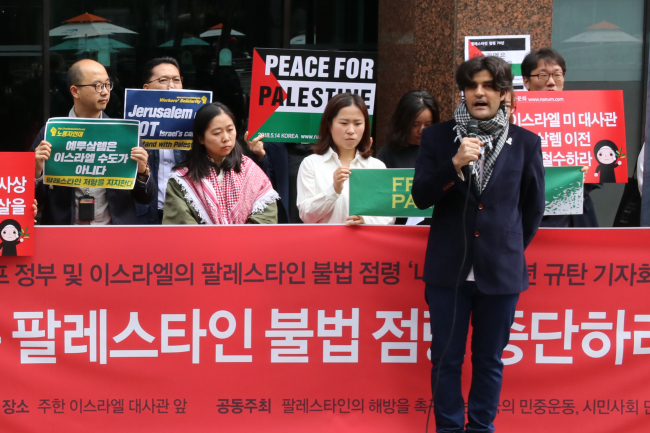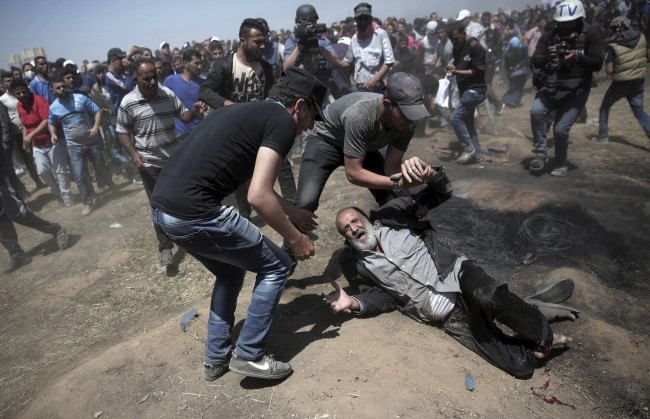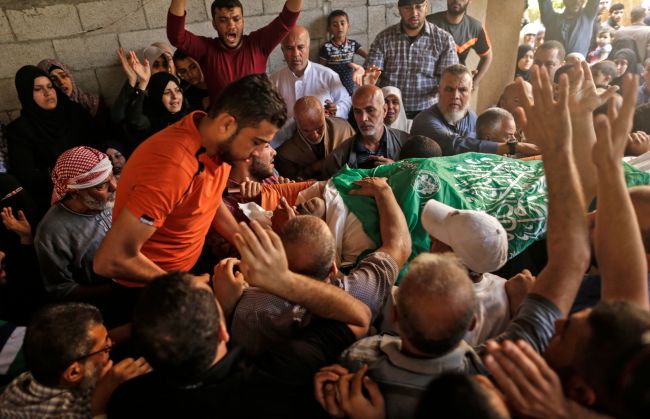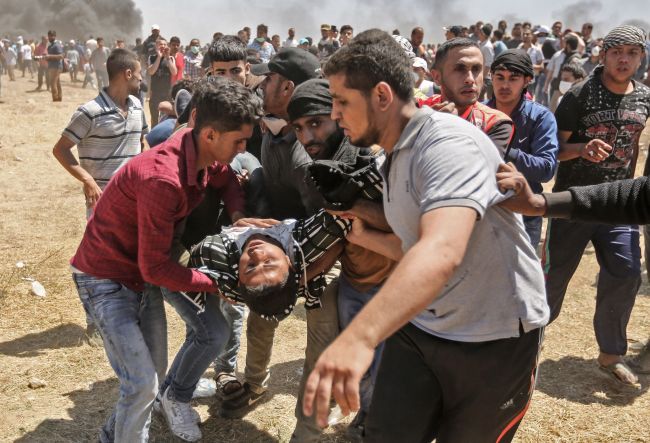[Herald Interview] ‘Korea should commiserate with Palestinian suffering for its peace, justice’
As Koreans have historically experienced the domination of superpowers, they “should know the meaning of occupation and injustice, while appreciating the value of the struggle for freedom.”
By Joel LeePublished : May 21, 2018 - 17:26
South Koreans should empathize with the plight of the Palestinians under Israeli occupation as the country seeks peaceful coexistence with North Korea, and deals with Japan to redress lingering injustices from the colonial occupation, said the head of nongovernmental organization Help Syria in an interview.
Abdul Wahab, who established the NGO dedicated to aiding Syrians under the Syrian government’s brutal oppression, took part in a protest in front of the Israeli Embassy in Seoul on May 14 against Israel’s harsh control of Gaza and the West Bank as well as the United States’ relocation of its embassy to Jerusalem from Tel Aviv.
“Tomorrow (May 15) will mark the 70th anniversary of the ‘Nakba,’ or ‘catastrophe,’ commemorating the more than 700,000 Palestinians who were forcibly displaced and expelled out of their homeland (from the 1948 war surrounding Israel’s creation),” said a coalition of 39 South Korean progressive and pacifist organizations.
“In that land, Israel erected an 8-meter high wall spanning 700 kilometers, effectively making Palestinians ‘jailbirds.’ Israel must stop its illegal occupation of those territories.”
Abdul Wahab, who established the NGO dedicated to aiding Syrians under the Syrian government’s brutal oppression, took part in a protest in front of the Israeli Embassy in Seoul on May 14 against Israel’s harsh control of Gaza and the West Bank as well as the United States’ relocation of its embassy to Jerusalem from Tel Aviv.
“Tomorrow (May 15) will mark the 70th anniversary of the ‘Nakba,’ or ‘catastrophe,’ commemorating the more than 700,000 Palestinians who were forcibly displaced and expelled out of their homeland (from the 1948 war surrounding Israel’s creation),” said a coalition of 39 South Korean progressive and pacifist organizations.
“In that land, Israel erected an 8-meter high wall spanning 700 kilometers, effectively making Palestinians ‘jailbirds.’ Israel must stop its illegal occupation of those territories.”

Particularly in Gaza -- dubbed “the largest prison on earth,” as some 2 million people there are blockaded by land, air or sea -- Palestinians have been denied access to basic human rights and face grave shortages in water, electricity and health care.
The organizations also urged the Korean government to declare its opposition to Israel’s “unabated slaughter” of Palestinian people, including women and children, and the US’ recognition of Jerusalem as the new Israeli capital. By international law, Jerusalem does not belong to any particular state, as it is deemed the holy city of Islam, Judaism and Christianity. As such, most of the foreign embassies are located in Tel Aviv, Israel’s economic center. Palestinians regard East Jerusalem as the prospective capital of their future state.
“The South Korean government has opposed the US’ recognition of Jerusalem in a United Nations General Assembly vote on Dec. 21 last year (which voted 128-9 to declare Washington’s recognition ‘null and void’),” they said. “Answering the Palestinians’ calls for international help would be South Korea’s rightful responsibility and duty, as the country is forging peace and cooperation on the Korean Peninsula on the back of international support.”
As a practical step, the organizations demanded Seoul -- a member of the UN Human Rights Council -- abide by the council’s resolution to impose an arms sales embargo on Israel at its 37th session in Geneva in March, when Korea abstained from voting.

In a separate interview, Wahab told The Korea Herald that “because of the greed of the superpowers, the Korean Peninsula was divided into two states. Korean people have been displaced and suffered a lot for a long time.”
As Koreans have historically experienced the domination of superpowers, they “should know the meaning of occupation and injustice, while appreciating the value of the struggle for freedom,” he added.
However, the social activist claimed the Korean government and most Koreans have turned a blind eye to the Palestinian cause on the basis of strong commercial, cultural and military ties to Israel.
“This contrasts with Korea’s experience with injustice and occupation. So we ‘Arabs’ are disappointed,” he said. “We ask the Korean people and government to act fairly and stand with the Palestinian people and support their legitimate struggle against the illegal Israeli occupation.”
The Gaza Strip and West Bank are claimed by the State of Palestine. Gaza since June 2007 has been governed by Hamas, a Palestinian Islamic organization that came to power in free elections in 2006.
As for the West Bank, the international community considers Israeli settlements there, including East Jerusalem, illegal under international law, though Israel disputes such a view. The International Court of Justice’s advisory ruling in 2004 concluded that events that came after the 1967 occupation of the West Bank by Israel -- including the Jerusalem Law, Israel’s peace treaty with Jordan and the Oslo Accords -- did not change the status of the West Bank as occupied territory under Israel.

Mentioning the killing of some 60 Palestinians and maiming of more than 2,400 people by the Israeli Defense Forces during a protest along the Gaza fence on May 14, which occurred in defiance of the opening of the US Embassy in Jerusalem, Wahab said “the international community can do much” to rein in Israel’s excessive use of force and expanding settlements in the Palestinian lands.
“The international community should put pressure on Israel to submit to international conventions on universal justice and human rights,” he stressed. “Countries should also send official delegations to support the Palestinian position and people, and break the illegal blockade of Palestinian territories, especially the Gaza Strip.”
Rupert Colville, a spokesman for the UN high commissioner for human rights, said in Geneva: “The mere fact of approaching a fence is not a lethal, life-threatening act, so that does not warrant being shot.” He also underscored that international laws that applied to Israel made clear that “lethal force may only be used as a measure of last, not first, resort.”
Israel, meanwhile, has portrayed the protests as a “terrorist” ploy by Hamas, and argued that it was merely defending its territory.
“The rioters are hurling firebombs and explosive devices towards the security fence and IDF forces, and are burning tires, throwing rocks and launching flaming objects in order to ignite fires in Israeli territory and harm IDF troops,” the Israel Defence Forces said in a statement.
“Our government expresses concerns over the large number of casualties from the protest in Gaza, and expects the efforts for the settlement of peace through dialogue to continue,” the South Korean Ministry of Foreign Affairs said in a statement regarding the May 14 incident.
“We urge related parties to cooperate in the efforts for forging lasting peace between Israel and Palestine on the basis of the two-state solution, as supported by the international community.”
By Joel Lee (joel@heraldcorp.com)








![[KH Explains] How should Korea adjust its trade defenses against Chinese EVs?](http://res.heraldm.com/phpwas/restmb_idxmake.php?idx=644&simg=/content/image/2024/04/15/20240415050562_0.jpg&u=20240415144419)










![[Today’s K-pop] Stray Kids to return soon: report](http://res.heraldm.com/phpwas/restmb_idxmake.php?idx=642&simg=/content/image/2024/04/16/20240416050713_0.jpg&u=)